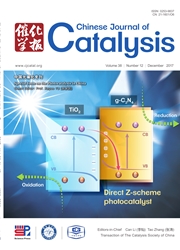

 中文摘要:
中文摘要:
到更有用的更高的烃的甲烷的合理、有效的变换是天然气利用的最重要的话题之一。尽管到珍贵混合物的甲烷激活和它的变换吸引增加的注意,甲烷变换经常为 syngas 通过消费精力的步以间接方法被做从甲烷改过的蒸气的生产。一些有希望的结果看起来为从甲烷的高增值产品的生产具有为一种选择和潜在的线路的发展的意义。到更高的烃的甲烷的有效变换能作为中介经由甲基卤化物被认识到。在 halomethane 的生产以后,他们能在修改沸石和 SAPO 上被转变到汽油和轻石蜡分子的筛。高变换效率和选择显示了工业申请的可行性。研究在基本研究和工业申请从观点获得了最近成长的兴趣。反应机制上的学习从甲基卤化物使 CC 契约建设的可能的线路清楚些,它是到更高的烃的 C1 反应物变换的重要问题。氢卤化物产生没在反应机制和催化剂的结构稳定性上在甲基卤化物变换期间施加明显的影响。这评论处理这个领域和注释的进化要探索的优点和缺点经由甲基卤化物发送为新、持续的 methane-to-olefins (MTO ) 和 methane-to-gasoline (MTG ) 的开发被阻止。
 英文摘要:
英文摘要:
Rational and efficient conversion of methane to more useful higher hydrocarbons is one of the most important topics of natural gas utilization.Although methane activation and its conversion to valuable compounds attract an increasing attention,methane conversion is often made in indirect way through the very energy-consuming step for syngas production from steam reforming of methane.Some promising results appeared to be of significance for the development of an alternative and potential route for the production of high value-added products from methane.Efficient conversion of methane to higher hydrocarbons could be realized via methyl halide as the intermediate.After the production of halomethane,they could be transformed to gasoline and light olefins over modified zeolites and SAPO molecular sieves.High conversion efficiency and selectivity indicated the feasibility of industrial application.The research gained recently growing interest from the point of view in both fundamental research and industrial application.The study on the reaction mechanism shed light on the possible route of C-C bond construction from methyl halide,which is the very important issue of the C1-reactant conversion to higher hydrocarbons.Hydrogen halide generation during methyl halide conversion did not exert apparent impact on the reaction mechanism and the structure stability of the catalysts.This review deals with the evolution of the field and comments the advantages to be explored and the drawbacks to be prevented for the development of new and sustainable methane-to-olefins(MTO) and methane-to-gasoline(MTG) routes via methyl halides.
 同期刊论文项目
同期刊论文项目
 同项目期刊论文
同项目期刊论文
 Well-Organized Zeolite Nanocrystal Aggregates with Interconnected Hierarchically Micro-Meso-Macropor
Well-Organized Zeolite Nanocrystal Aggregates with Interconnected Hierarchically Micro-Meso-Macropor Generation of diamondoid hydrocarbons as confined compounds in SAPO-34 catalyst in the conversion of
Generation of diamondoid hydrocarbons as confined compounds in SAPO-34 catalyst in the conversion of Temperature-Programmed Methanol Conversion on a Microscale Setup Equipped with Tapered Element Oscil
Temperature-Programmed Methanol Conversion on a Microscale Setup Equipped with Tapered Element Oscil Elucidating the olefin formation mechanism in the methanol to olefin reaction over AlPO-18 and SAPO-
Elucidating the olefin formation mechanism in the methanol to olefin reaction over AlPO-18 and SAPO- Synthesis of DNL-6 with a High Concentration of Si(4Al) Environments and its Application in CO2 Sepa
Synthesis of DNL-6 with a High Concentration of Si(4Al) Environments and its Application in CO2 Sepa Heptamethylbenzenium cation formation and the correlated reaction pathway during methanol-to-olefins
Heptamethylbenzenium cation formation and the correlated reaction pathway during methanol-to-olefins Polystyrene sulphonic acid resins with enhanced acid strength via macromolecular self-assembly withi
Polystyrene sulphonic acid resins with enhanced acid strength via macromolecular self-assembly withi Polystyrene Sulfonic Acid Resins with Enhanced Acid Strength via Macromolecular Self-assembly within
Polystyrene Sulfonic Acid Resins with Enhanced Acid Strength via Macromolecular Self-assembly within Synthesis of hierarchical beta zeolite by using a bifunctional cationic polymer and the improved cat
Synthesis of hierarchical beta zeolite by using a bifunctional cationic polymer and the improved cat Multimodal Zr-Silicalite-1 zeolite nanocrystal aggregates with interconnected hierarchically micro-m
Multimodal Zr-Silicalite-1 zeolite nanocrystal aggregates with interconnected hierarchically micro-m Heterogeneous Ceria Catalyst with Water-Tolerant Lewis Acidic Sites for One-Pot Synthesis of 1,3-Dio
Heterogeneous Ceria Catalyst with Water-Tolerant Lewis Acidic Sites for One-Pot Synthesis of 1,3-Dio Synthesis of mesoporous ZSM-5 catalysts using different mesogenous templates and their application i
Synthesis of mesoporous ZSM-5 catalysts using different mesogenous templates and their application i Clickable Periodic Mesoporous Organosilicas: Synthesis, Click Reactions, and Adsorption of Antibioti
Clickable Periodic Mesoporous Organosilicas: Synthesis, Click Reactions, and Adsorption of Antibioti Spatial confinement effects of cage-type SAPO molecular sieves on product distribution and coke form
Spatial confinement effects of cage-type SAPO molecular sieves on product distribution and coke form 期刊信息
期刊信息
